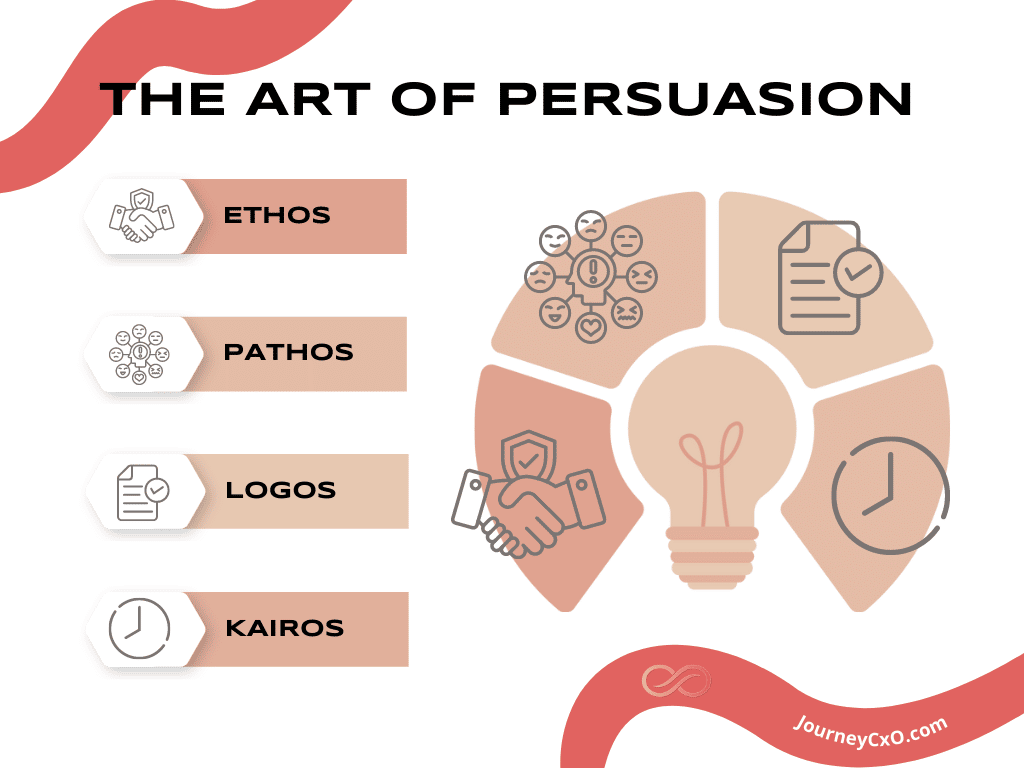Picture this scenario…
You are really hoping to land a new opportunity that you’ve been working on. Maybe it’s a new client for your business; or maybe a new job opportunity with a company that seems like a great fit. You are speaking to each other for the second or third time. Each side has already screened the other for ‘basic’ fit.
You’re one of the final few in consideration. So how do you close the deal?
The Art of Persuasion
Combine these four elements of persuasion (made famous by Aristotle and other Greek philosophers and often taught in middle school English writing classes.)
- Ethos
- Pathos
- Logos
- Kairos

Ethos
Serious consideration by others only arises if you have ethos.
Listening to you, the other side is asking themselves the following:
- Are they credible?
- Should I trust them and what they have to say?
- Do you have relevant skills and experiences?
- Is there any social proof offered by people I trust which resonates with me?
Without a baseline of trust most relationships (business or personal) are unlikely to persist or succeed.
Pathos
Pathos is the appeal to emotions, values and beliefs. This is about communicating that you understand the counterparty at the emotional level and share common values.
The other party is evaluating you based on the following:
- How do they make me feel? Heard, understood, happy, etc.
- Is the story I am hearing causing me to experience a positive emotion or less of a negative one (stress, anxiety, fear)? Are these feelings likely to persist over time?
- Do we appear to share values in common?
As much as we like to believe that decisions are rational, most decisions (even those in the business world) are swayed by emotions.
Logos
Logos is the appeal to reason and factual information. We tend to over index of logos in trying to persuade others, especially in business settings.
Logos is utilized when we talk about:
- Our product offering (features, functionality) or personal skills
- Return on investment or other cost / benefit analysis
- Comparative data (relative to competitive offerings)
Kairos
It is often said, ‘in life timing is everything’. Kairos, or right timing, is probably the hardest to achieve on a consistent basis. Success often depends on whether our pitch to the other meets the following (often totally out of our control):
- Appropriate time and place. There is an urgency that exists.
- Contextually relevant. Something else has happened that raises the stakes and you indirectly appeal to that.
How can you increase the chances that your mix of these tools will work?
Do Your Research
Sometimes there are prompts that can guide you — often this is the case with job applications, RFPs and even dating profiles.
If not, invest some time to research what it takes to be well above average for the ‘role’ you are applying for.
Ask Questions
When you can, ask the other party to describe what they are seeking or at least what problems they are currently struggling to solve. Sometimes people are better at describing what their day or week would look like if it worked smoothly.
Risk Being Different
Each of us is unique and distinctive. Your job is to tell that story in a way that gets the other party to value you for who you are. Quality storytelling applies equally to a job interview, a college application or in a dating profile. You may choose to reveal less depending on the situation.
Be Authentic and Volunteer Weaknesses
No one is perfect. Nor is any product solution. Proactively and voluntarily share your weaknesses. Including what you have learned from past failures. Erring on the side of being slightly more authentic, vulnerable and revealing engenders trust. And setting expectations fairly will result in better long-term outcomes for both sides.
Read the ‘Room’
Often it is better to let the other party talk more. But you do want to be sure to get your point across clearly and answer questions when asked. If you feel you have not had a chance to properly express your selling proposition, ask them again towards the end of the conversation about their needs.
If You Don’t Get the Outcome You Hoped For…
Remember you will fail far more than you succeed. In sales, a close rate of 20% is usually excellent. In hiring, for most roles only one person is hired after many are interviewed, and even more are initially evaluated.
If you really want the opportunity, ask for feedback, politely. Inquire as to what else could you have done to get the desired outcome? Try to figure out what problem they were unsure you could solve.
To increase your odds of success in the future, treat each opportunity as practice. And ask others (your peers in sales or the job search) for tips on what they have tried that has worked well.
Not every story resonates with everyone. That is just fine. Because you want your story to fit with the right people and organization. So that the reality meets or exceeds the expectations.
